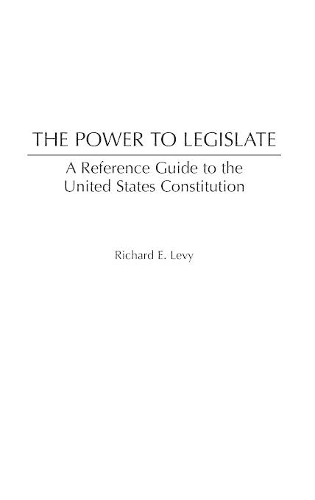
The Power to Legislate: A Guide to the United States Constitution
(Hardback)
Publishing Details
The Power to Legislate: A Guide to the United States Constitution
By (Author) Richard E. Levy
Bloomsbury Publishing PLC
Praeger Publishers Inc
1st July 2006
United States
Classifications
General
Non Fiction
Politics and government
328.73074
Physical Properties
Hardback
238
Description
In a political climate where the machinery of the federal government has grown increasingly complex, The Power to Legislate offers a comprehensive and in-depth analysis of the extent and limitations of legislative power granted by the U. S. Constitution. By examining the historical development of the Constitution as well as judicial precedent set by the Supreme Court, Richard E. Levy develops a systematic account of federal legislative power that is ideal for anyone interested in constitutional history and political science. Levy focuses his investigation on three distinct, yet related, aspects of federal legislative power: the necessary and proper clause of Article I, the delegation of powers to the various federal institutions, and the deliberative powers of Congress to conduct investigations and interrogations. The Power to Legislate synthesizes these three crucial ideas into a fresh perspective that sheds light on today's controversies.
Reviews
Levy has written an excellent work that is part of a series on constitutional law and follows a standard arrangement: a brief history of the subtopic, a lengthy analysis of the current state of the law on that topic, a bibliographic essay, a table of cases, and an index. The author focuses on the extent of the power of Congress, particularly the limitations of legislative power granted by the Constitution, as well as judicial precedent set by the Supreme Court. He concentrates on three issues: the legislative authority conferred by the necessary and proper clause of Article 1, the authority of Congress to delegate power to courts and executive agencies, and the power to investigate. Following an introduction, the book is divided into two parts: History of the Federal Legislative Power and Analysis of the Federal Legislative Power. Sections range from The Antebellum Era and The New Deal Crisis and the Demise of Laissez Faire Constitutionalism to Legislative Delegation and Deliberative Powers. Recommended. All levels. * Choice *
Levy works on the complex issue of the separation of powers, focusing on the extent of the power of Congress, including the legislative authority conferred by the necessary and proper clause of Article I of the Constitution, the power of the legislature to relegate power to courts and executive agencies, and the power it exercises without explicit authorization in the Constitution, such as the power to investigate. He analyzes the history of federal legislative power from the time of the Articles of Confederation to the new federalism, collective action and federal legislative power, necessary and proper laws such as the ^IMcCulloch^R test, the role of delegation in the separation of powers including the intelligible principle test, and deliberative powers and their external limitations. He includes a table of cases. * Reference & Research Book News *
Author Bio
Richard E. Levy is Professor of Law at the University of Kansas School of Law, where he joined the faculty in 1985. Since joining the faculty at the University of Kansas, Levy has published extensively on issues relating to constitutional law and government institutions and was a Postlewaite Research Fellow from 1996-1999.
